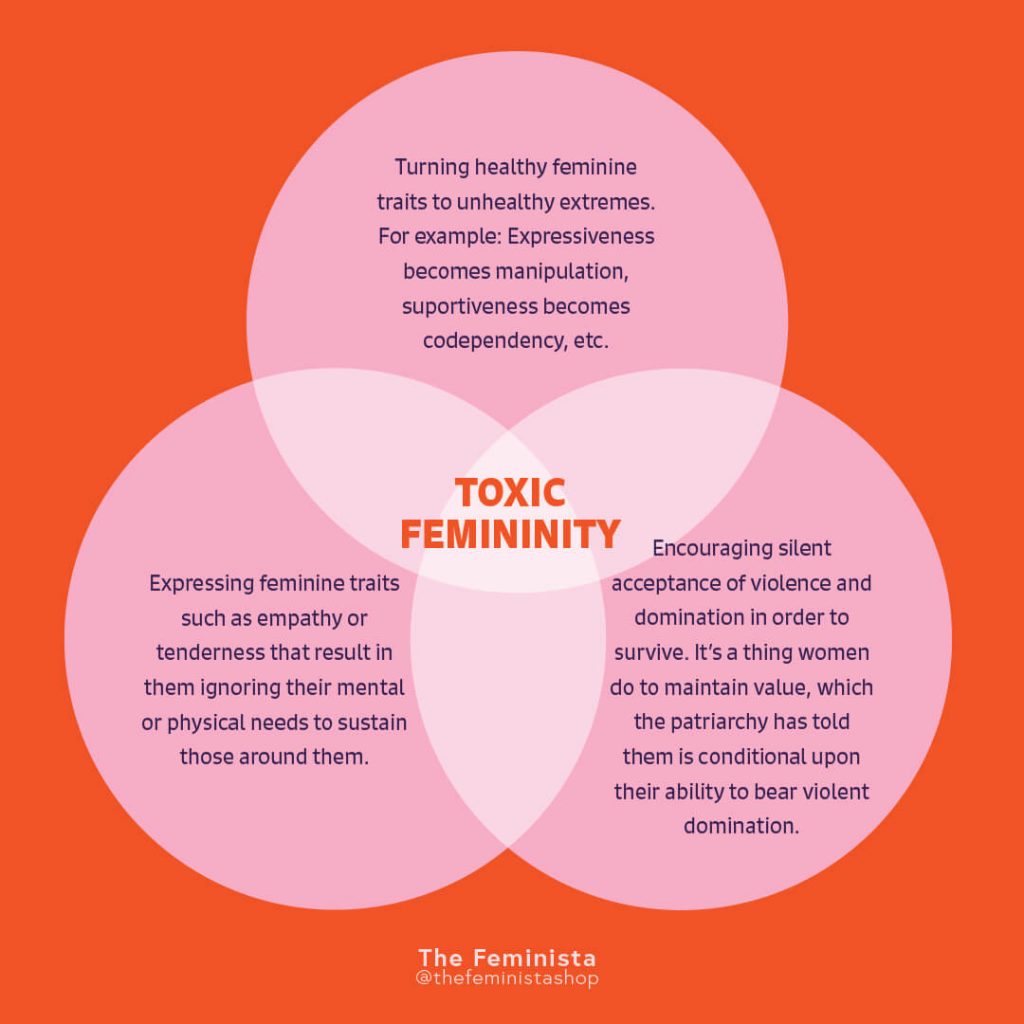Toxic Femininity, Its Impact, And What We Can Do About It (With Examples)

Toxic femininity, just like toxic masculinity, is a broad term that refers to a repressive and stereotypical representation of women. Toxic femininity is a term that can be used to describe the default gender roles set by a patriarchal society.
This broad term can also be a concept that limits women to present themselves as passive, submissive, gentle, and physically attractive. Toxic femininity also proposes that all women are without company and are to be defined by a male presence in their life either as a father or a husband.
Just like toxic masculinity presents all men to be violent, dominating, not to show their emotions, and not embrace anything feminine, toxic femininity presents all women to silently accept the violence, to be quiet, nurturing, and submissive.
In this context, toxic femininity presents women or womanhood in a manner that objectifies and harms women. Let’s take a look at what toxic femininity is, its impact, and what we can do about it.
What Is Toxic Femininity?
Toxic femininity is any thought, action, or behavior by women that benefit their male counterparts at the expense of (a woman’s) autonomy, emotions, and well-being. While toxic masculinity and toxic femininity can be two sides of the same coin, the pressure on men is to play the aggressor to stay in control while the pressure on women is to play meek and please the ones in control.

In a twisted way, toxic femininity and masculinity are acted out by women and men to support their worth. These social theories just fortify a woman’s supposedly submissive nature and empower a man by saying that violence and aggression are accepted.
Toxic femininity is created by a multitude of gender-culture-specific notions:
- Being Docile: That means that a woman must always accept control and should be flexible in thinking.
- Hyper-Feminism: This means that a woman must follow stereotypical feminine behavior.
- Policing Femininity: This means pressuring other women to mirror feminine behaviors and negatively commenting if they go against that (even by choice).
Toxic femininity is a byproduct of a patriarchal society. The toxic thinking and ideas of feminism only deny women their autonomy and identity.
However, many use toxic femininity to spread harmful representations of femininity or feminism. For example, many may claim that women are naturally emotional and manipulative.
Suggested Read: What is Feminist Therapy: Techniques, Limitations and How to Start
Examples Of Toxic Femininity
Here are some common examples of toxic femininity that you might hear or come across in your daily life:
- The idea that women won’t be happy if they don’t have children
- The idea that women are supposed to act weak and helpless to attract a man
- The idea of women making fun of other women to become more attractive to men
- The idea that a woman’s attractiveness is based on her physical attributes, i.e., saying, “Real women have curves.”
- The idea that a woman should be not be considered guilty of hurting her spouse/partner
What’s The Impact Of Toxic Femininity?
Toxic femininity is harmful as it submits to the overpowering of women as natural for social approval. In such a context, the pressure a woman has to face in society about being shy, quiet, and submissive can cause them to become a victim of abuse.
In other cases such as toxic femininity in the workplace can create a toxic working environment for the women’s mental health. Moreover, not letting women advance in their careers can present a lack of diversity in positions and leadership roles.
When we talk about women’s equality, toxic femininity is counterproductive as women’s quality seeks to preserve the toxic gender-defined roles.
What Can We Do About It?
Instead of making a woman feel supported, toxic femininity only pressures a woman to feel ashamed and confused for their non-gender-specific thoughts and beliefs. Toxic femininity is everywhere but there are also examples of healthy and authentic femininity.
Here are some ways we can fight toxic femininity:
1. Re-Learn What You’ve Been Taught:
Think about what you’ve learned so far about misogyny and related ideas. Are you doing things for your male counterparts or yourself? Are you seeking others’ approval or are you making decisions based on what you desire? Re-learn what you’ve been taught so far.
2. Stand Up And Speak:
Call out on toxic femininity when you see it happening. Have brave conversations with others and speak up against the traditional gender-specific patriarchal power.
3. Be Careful:
Using the term “toxic femininity” should be done carefully and with consideration. Many people use this term to promote anti-feminism too. So be careful.
4. Be Assertive:
You’ve seen men assertively speaking for what they want without worrying about how their needs will impact others around them, right? Follow their lead and learn to be assertive in your needs.
Toxic femininity can be quite overwhelming at times especially when it affects your life, your expression, and your mental peace. Toxic femininity can restrict the ways a woman may feel comfortable expressing herself. Speaking up against such ideas is important so is becoming aware of how the gender-specific labels and stereotypes are affecting us.
I hope this blog helped. For more, you can write to us at info@calmsage.com or DM us on social media. You can also share your thoughts with us in the comments section below!
Take Care!




















